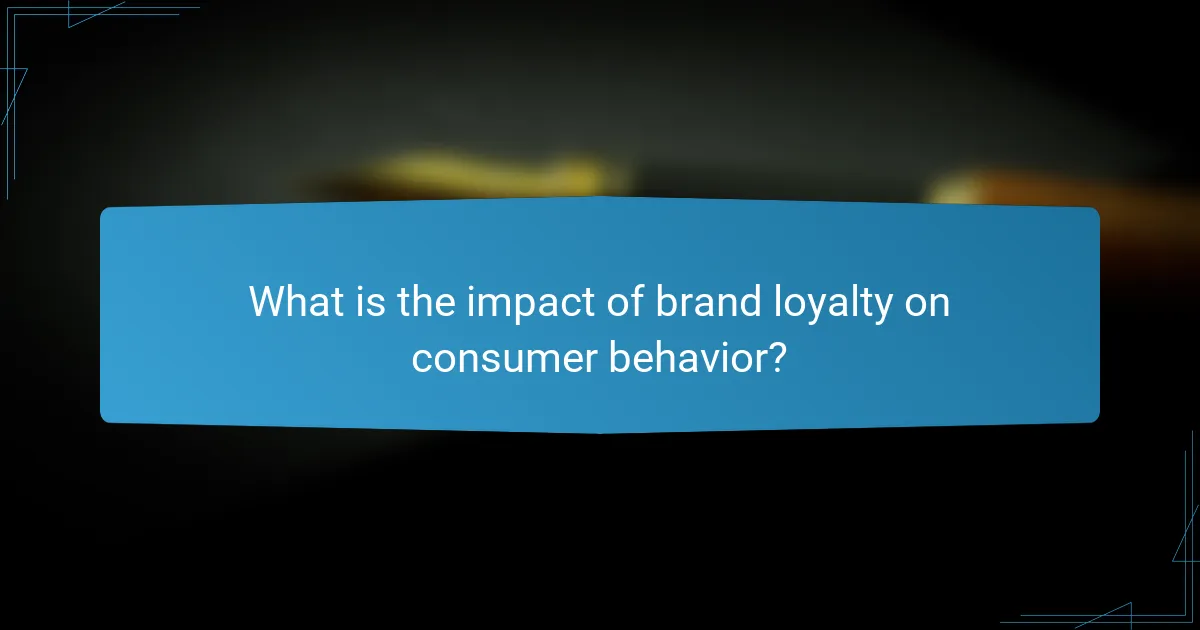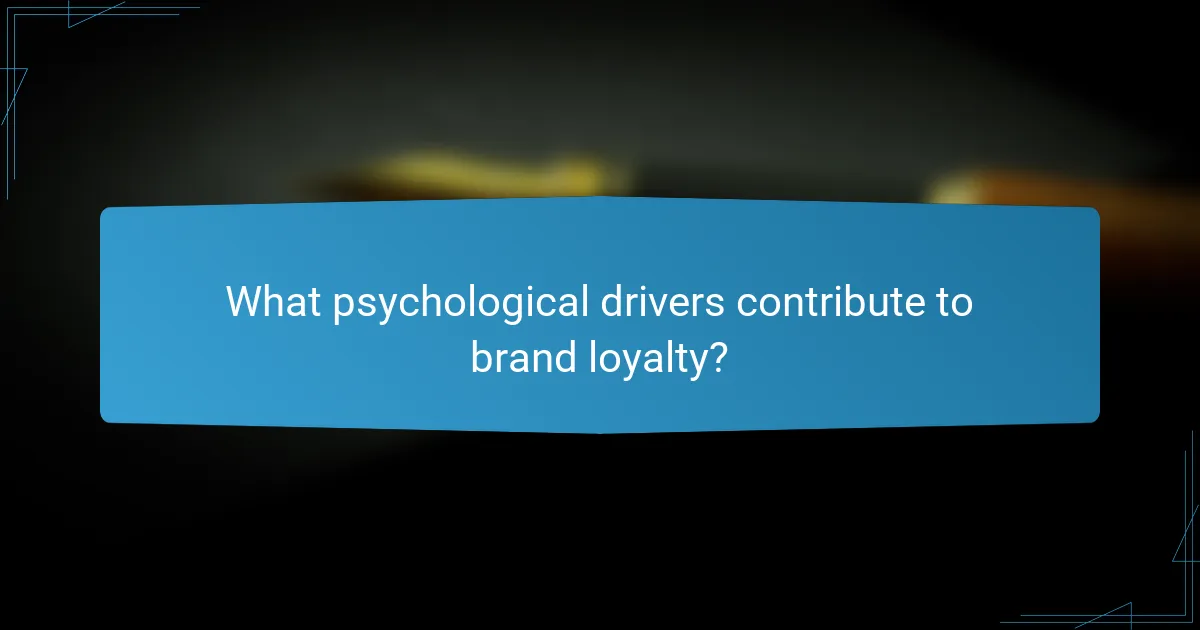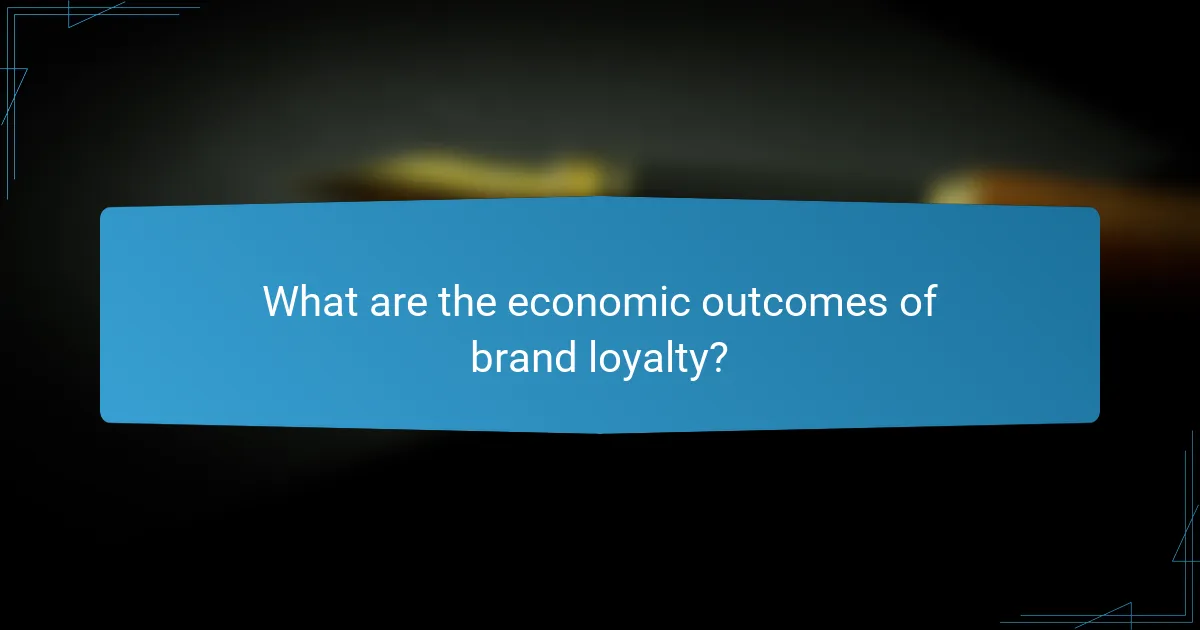Brand loyalty is a crucial factor that significantly influences consumer behavior, leading to repeat purchases and a reduced likelihood of switching to competitors. Key psychological drivers of brand loyalty include emotional connection, trust, perceived value, and social identity, all of which enhance customer retention and encourage word-of-mouth marketing. Research indicates that strong brand loyalty can increase retention rates by up to 65% and boost profits by 25% to 95% with a mere 5% increase in retention. Loyal customers not only tend to spend more per transaction but also actively recommend brands, contributing to new customer acquisition and overall financial performance. This article explores the impact of brand loyalty on consumer behavior, emphasizing its psychological drivers and economic outcomes.

What is the impact of brand loyalty on consumer behavior?
Brand loyalty significantly influences consumer behavior. It leads to repeat purchases and reduces the likelihood of switching to competitors. Loyal customers often exhibit a higher willingness to pay premium prices. According to a study by Aaker (1991), strong brand loyalty can enhance customer retention rates by up to 65%. Additionally, loyal consumers are more likely to recommend the brand to others. This word-of-mouth marketing can attract new customers. Furthermore, brand loyalty fosters emotional connections, making consumers feel valued and understood. These factors contribute to a brand’s long-term success and profitability.
How does brand loyalty influence purchasing decisions?
Brand loyalty significantly influences purchasing decisions by creating a preference for specific brands. Consumers with strong brand loyalty tend to choose familiar brands over alternatives. This preference often leads to repeat purchases and reduces the likelihood of switching to competitors. According to a study by the Harvard Business Review, loyal customers are four times more likely to purchase from their preferred brand. Additionally, brand loyalty can lead to consumers being less sensitive to price changes. They may perceive loyal brands as higher quality, which reinforces their purchasing choices. Thus, brand loyalty directly impacts consumer behavior and market dynamics.
What psychological factors drive brand loyalty?
Emotional connection is a key psychological factor that drives brand loyalty. Consumers often develop feelings of attachment to brands that resonate with their values and identity. Trust also plays a significant role; consumers are more likely to remain loyal to brands they perceive as reliable and honest. Consistency in brand messaging reinforces this trust over time.
Additionally, social influence can enhance brand loyalty. Recommendations from friends or positive online reviews can sway consumer preferences. The sense of belonging to a community around a brand can further strengthen loyalty. According to research by Aaker (1997), brand loyalty is closely tied to consumer satisfaction and perceived value. Satisfied customers are more likely to repurchase and recommend the brand to others.
How does emotional attachment affect consumer choices?
Emotional attachment significantly influences consumer choices. Consumers with strong emotional ties to a brand are more likely to choose it over competitors. This attachment often stems from positive experiences, memories, or perceived values associated with the brand. Research indicates that emotional connections can lead to increased brand loyalty. For instance, a study by Thomson, MacInnis, and Park (2005) highlights that emotional attachment enhances the likelihood of repeat purchases. Furthermore, consumers may overlook price differences when emotionally attached to a brand. This behavior demonstrates that emotional factors can outweigh rational decision-making in consumer behavior.
Why is understanding brand loyalty important for businesses?
Understanding brand loyalty is crucial for businesses because it directly influences customer retention and profitability. Loyal customers tend to make repeat purchases, which contributes to stable revenue streams. According to a study by Bain & Company, increasing customer retention rates by just 5% can lead to profit increases of 25% to 95%. Brand loyalty also reduces marketing costs since retaining existing customers is less expensive than acquiring new ones. Furthermore, loyal customers often become brand advocates, driving new customer acquisition through word-of-mouth referrals. This organic growth can significantly enhance a brand’s reputation and market presence. Therefore, understanding brand loyalty enables businesses to develop strategies that foster long-term relationships with customers, ultimately leading to sustained success.
What economic outcomes are associated with strong brand loyalty?
Strong brand loyalty leads to increased customer retention and higher sales revenue. Loyal customers are more likely to make repeat purchases. They often spend more compared to new customers. According to a study by Bain & Company, increasing customer retention rates by 5% can increase profits by 25% to 95%. Strong brand loyalty also reduces marketing costs. Retaining existing customers is generally cheaper than acquiring new ones. Additionally, loyal customers can become brand advocates. They often refer others, which can drive new customer acquisition. Overall, strong brand loyalty positively impacts a company’s bottom line.
How can businesses measure the impact of brand loyalty?
Businesses can measure the impact of brand loyalty through several key metrics. One effective method is tracking customer retention rates. High retention rates indicate strong brand loyalty. Another approach is analyzing customer lifetime value (CLV). CLV quantifies the total revenue a business can expect from a customer over their relationship. Surveys and feedback can also provide insights into brand perception and loyalty levels. Net Promoter Score (NPS) is a common tool used to gauge customer loyalty and likelihood to recommend. Additionally, monitoring repeat purchase rates helps assess loyalty trends. Research shows that loyal customers are more likely to make repeat purchases, contributing to higher overall revenue. According to a study by Bain & Company, increasing customer retention by just 5% can boost profits by 25% to 95%.

What psychological drivers contribute to brand loyalty?
Emotional connection, trust, perceived value, and social identity are key psychological drivers of brand loyalty. Emotional connection fosters a bond between consumers and brands, enhancing loyalty. Trust ensures consumers feel secure in their purchasing decisions. Perceived value influences consumers’ assessment of a brand’s worth based on benefits versus costs. Social identity allows consumers to align with brands that reflect their self-image or group affiliations. Research by Aaker (1997) highlights the importance of brand personality in creating emotional connections. Additionally, studies show that trust can significantly increase repeat purchases, reinforcing loyalty.
How do consumer perceptions shape brand loyalty?
Consumer perceptions significantly shape brand loyalty. Positive perceptions lead to increased trust and emotional connection with the brand. Brands perceived as high quality often enjoy greater customer retention. Research indicates that 64% of consumers cite shared values as a reason for brand loyalty. Negative perceptions can quickly erode loyalty, resulting in customer attrition. Additionally, consistent brand messaging reinforces positive consumer perceptions. Brands that engage with their audience effectively can enhance loyalty over time. This interplay between perception and loyalty is crucial for long-term business success.
What role does brand identity play in consumer loyalty?
Brand identity significantly influences consumer loyalty. It encompasses the visual elements, messaging, and values that shape consumer perceptions. A strong brand identity fosters emotional connections with consumers. This connection leads to trust and repeat purchases. Research indicates that 64% of consumers cite shared values as a primary reason for loyalty. Additionally, brands with clear identities can differentiate themselves in competitive markets. This differentiation encourages consumers to choose them over alternatives. Ultimately, brand identity is crucial for cultivating lasting consumer relationships.
How does trust influence brand loyalty?
Trust significantly influences brand loyalty by fostering consumer confidence. When consumers trust a brand, they are more likely to repurchase its products. This trust reduces perceived risk associated with buying decisions. According to a study by the Journal of Brand Management, 70% of consumers prefer brands they trust. Trust leads to stronger emotional connections with the brand. These connections encourage consumers to advocate for the brand to others. Additionally, trusted brands can command premium pricing. This demonstrates that trust is a critical driver of sustained brand loyalty and economic success.
What are the emotional drivers behind brand loyalty?
Emotional drivers behind brand loyalty include trust, connection, and identity. Trust fosters a sense of security in consumers. When customers trust a brand, they are more likely to remain loyal. Connection occurs when consumers feel an emotional bond with a brand. This bond can be formed through shared values or experiences. Identity plays a crucial role as consumers often associate brands with their self-image. A brand that aligns with a consumer’s identity can enhance loyalty. Research shows that emotional connections can increase customer retention rates by up to 65%. Therefore, emotional drivers are essential for cultivating brand loyalty.
How do personal experiences affect brand attachment?
Personal experiences significantly influence brand attachment. Positive experiences with a brand create emotional connections. These connections lead to increased loyalty and preference for that brand. A study by Thomson, MacInnis, and Park (2005) found that emotional bonds formed through personal experiences enhance consumer attachment. Negative experiences can diminish attachment and lead to brand avoidance. Consumers often recall personal experiences when making purchasing decisions. This recall can reinforce or weaken their attachment to a brand over time. Overall, personal experiences play a crucial role in shaping brand attachment and consumer behavior.
What is the impact of social influence on brand loyalty?
Social influence significantly impacts brand loyalty. It shapes consumer perceptions and behaviors through social proof and peer recommendations. Studies show that 70% of consumers trust recommendations from friends and family over other forms of advertising. This trust fosters emotional connections to brands. Additionally, social media amplifies this effect, as users often seek validation from their networks. Brands that engage positively with their audience can enhance loyalty through community building. Thus, social influence is a critical driver of sustained brand loyalty.

What are the economic outcomes of brand loyalty?
Brand loyalty leads to increased customer retention and higher sales revenue. Loyal customers are more likely to repurchase products and services. This behavior reduces marketing costs since retaining existing customers is less expensive than acquiring new ones. According to a study by Bain & Company, increasing customer retention rates by 5% can increase profits by 25% to 95%. Additionally, loyal customers often spend more per transaction, contributing to higher average order values. They also tend to recommend brands to others, driving new customer acquisition through word-of-mouth. Overall, brand loyalty significantly enhances a company’s financial performance.
How does brand loyalty affect customer retention rates?
Brand loyalty significantly enhances customer retention rates. Loyal customers are more likely to repurchase from a brand. Research shows that acquiring new customers can cost five times more than retaining existing ones. According to a study by Bain & Company, increasing customer retention rates by just 5% can lead to a profit increase of 25% to 95%. Brand loyalty fosters emotional connections, making customers less sensitive to price changes. This emotional bond encourages repeat purchases and long-term relationships. Ultimately, strong brand loyalty translates into higher retention rates and increased profitability for businesses.
What is the relationship between brand loyalty and customer lifetime value?
Brand loyalty directly influences customer lifetime value (CLV). Loyal customers tend to make repeat purchases over time. This consistent buying behavior increases their overall value to the brand. Research indicates that increasing customer retention by just 5% can boost profits by 25% to 95%. Loyal customers also tend to spend more per transaction. Additionally, they often refer new customers, further enhancing CLV. Therefore, a strong relationship exists where brand loyalty significantly elevates customer lifetime value.
How does brand loyalty impact market share and profitability?
Brand loyalty significantly enhances market share and profitability. Loyal customers consistently choose a brand over competitors. This behavior leads to increased sales volume and a stable revenue stream. Companies with high brand loyalty often enjoy premium pricing. Loyal customers are less sensitive to price changes. According to a study by the Harvard Business Review, a 5% increase in customer retention can boost profits by 25% to 95%. Additionally, brand loyalty reduces marketing costs. Retaining existing customers is less expensive than acquiring new ones. Therefore, strong brand loyalty positively correlates with market share and profitability.
What strategies can businesses implement to enhance brand loyalty?
Businesses can enhance brand loyalty by implementing personalized customer experiences. Personalization creates a connection between the brand and the consumer. According to a study by Epsilon, 80% of consumers are more likely to make a purchase when brands offer personalized experiences.
Another effective strategy is to provide exceptional customer service. A survey by HubSpot found that 93% of customers are likely to make repeat purchases with companies that offer excellent customer service.
Loyalty programs also play a significant role. They incentivize repeat purchases and foster a sense of belonging. Research from Bond Brand Loyalty shows that 77% of consumers participate in loyalty programs.
Engaging with customers on social media can strengthen brand loyalty as well. Brands that interact with their audience build trust and community. According to Sprout Social, 70% of consumers feel more connected to brands with a strong social media presence.
Finally, maintaining transparency and ethical practices can enhance brand loyalty. Consumers increasingly prefer brands that align with their values. A study by Cone Communications found that 87% of consumers will purchase a product because a brand advocated for an issue they cared about.
How can personalized marketing improve brand loyalty?
Personalized marketing can improve brand loyalty by creating tailored experiences for consumers. This approach enhances customer engagement and satisfaction. When brands address individual preferences, customers feel valued and understood. Research shows that 80% of consumers are more likely to make a purchase when brands offer personalized experiences. Furthermore, personalized marketing increases repeat purchases by fostering emotional connections. Brands that utilize data analytics can effectively segment their audience for targeted campaigns. This strategy leads to higher retention rates and brand advocacy. Ultimately, personalized marketing transforms transactional relationships into long-term loyalty.
What role does customer service play in fostering loyalty?
Customer service plays a critical role in fostering customer loyalty. Effective customer service creates positive experiences for customers. These experiences lead to increased satisfaction and trust in the brand. Research indicates that 70% of consumers say they have spent more money with a company due to positive customer service experiences. Additionally, companies with strong customer service can retain 90% of their customers. This retention is essential for long-term loyalty and repeat business. Furthermore, personalized service enhances emotional connections between customers and brands. These connections significantly influence customers’ likelihood to return and recommend the brand to others.
What best practices can companies adopt to build brand loyalty?
Companies can build brand loyalty by offering exceptional customer service. High-quality customer service creates positive experiences. Positive experiences lead to repeat purchases. Companies should also engage with customers through personalized marketing. Personalized marketing makes customers feel valued. Building a community around the brand fosters connections. Engaged customers are more likely to remain loyal. Additionally, companies should maintain consistent brand messaging. Consistency reinforces brand identity and trust. Implementing loyalty programs can incentivize repeat business. According to a study by Bond Brand Loyalty, 77% of consumers participate in loyalty programs. These practices create a strong foundation for brand loyalty.
How can feedback mechanisms strengthen consumer relationships?
Feedback mechanisms strengthen consumer relationships by facilitating open communication between brands and consumers. These mechanisms allow consumers to express their opinions and experiences. Brands can then respond to feedback, demonstrating that they value consumer input. This engagement fosters trust and loyalty, as consumers feel heard and appreciated. Research shows that companies that actively seek and respond to feedback see a 25% increase in customer satisfaction. Additionally, positive interactions through feedback can lead to repeat purchases and brand advocacy. By using feedback effectively, brands can tailor their offerings to better meet consumer needs, enhancing overall relationships.
What are the key elements of a successful loyalty program?
A successful loyalty program includes clear rewards, easy enrollment, personalized communication, and consistent engagement. Clear rewards provide tangible benefits that motivate customers to participate. Easy enrollment encourages more customers to join, increasing the program’s reach. Personalized communication enhances customer experience by making interactions relevant and tailored. Consistent engagement keeps customers active and invested in the program. Research shows that programs with these elements can increase customer retention by up to 30%.
The main entity of this article is brand loyalty, which significantly impacts consumer behavior and purchasing decisions. The article explores the psychological drivers of brand loyalty, including emotional connections, trust, and social influence, and discusses how these factors enhance customer retention and profitability. Additionally, it examines the economic outcomes associated with strong brand loyalty, such as increased sales revenue and reduced marketing costs. Strategies for businesses to foster brand loyalty, including personalized marketing and exceptional customer service, are also highlighted, providing a comprehensive overview of the relationship between brand loyalty and consumer behavior.